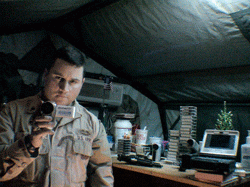The View from a Humvee
The War Tapes, directed by Deborah Scranton ’84; showing in many U.S. cities; see www.thewartapes.com/screenings for locations.
From the Trojan War to the war in Vietnam, the experience of combat has somehow made its way back to the home front, whether in the form of an epic poem by Homer or the gritty video on the nightly news. For her extraordinary new documentary, The War Tapes, filmmaker Deborah Scranton had a better idea. Or, at least, a unique one. Offered the chance to embed herself with New Hampshire National Guardsmen during their year in Iraq, she instead gave her cameras to several soldiers and asked them to film their own experiences. The result is an intimate, gripping, helmet’s-eye view of the war.
Specialist Mike Moriarty, a thirty-five-year-old mechanic with a wife and family, is a die-hard Bush supporter who says 9/11 struck him hard. Describing himself as “substantially patriotic,” he insists to his National Guard recruiters, “You shoot me into a unit—if they go to Iraq.” But he’s no simplistic, war-mongering caricature. The horrific and needless death of a young Iraqi woman, accidentally run over by his military convoy, devastates him. Further, like many other U.S. soldiers in Iraq, he believes that twenty years from now the country of Iraq will be a better place because he was there.
Sergeant Steve Pink—the name is straight out of Quentin Tarantino’s Reservoir Dogs—is significantly less gung-ho. Something of a writer, the twenty-four-year-old is Over There to help pay for college. He brings an acerbic wit to what he calls his home movies, wryly noting in his journal such milestones as “Today was the first time I shook a man’s hand that wasn’t attached to his arm.”
Pink is bluntly pragmatic about the war. He wishes the United States would get the oil and money it came for—“Dick Cheney’s crack,” he calls it—and get out of Iraq. Yet beneath the cynicism is a sensitivity. “This is happening,” he says, in disbelief that he’s halfway around the world shooting at people. “And it will have a lasting effect on the rest of my life.”
Sergeant Zack Bazzi, also twenty-four, is the true warrior of the three. He’s already served in Bosnia and Kosovo and intends to re-up for Iraq after his year is over. “The only bad thing about the army is, you can’t pick your wars,” Bazzi admits. His mother took him out of Lebanon when he was a child so he wouldn’t end up dodging explosions in some Mideast desert. As much as Bazzi loves the military, he can’t understand why it doesn’t try harder to understand the culture of the people it’s supposed to be saving. For example, he points out, the palm-out American hand signal for “halt” means “hello” in Iraq.
You see and hear things in The War Tapes that even Joseph Heller couldn’t have made up in Catch-22. A couple of soldiers debate whether a severed limb looks more like ground hamburger or pot roast. Another gripes that the military is paying Halliburton subsidiary Kellogg Brown and Root $28 per plastic plate, whether the plate’s filled with lousy food or covering a meal to keep it warm. After risking his life to guard a KBR “poop truck,” Bazzi films its load being sprayed onto a septic waste field. “Look at the little tiny rainbow!” he observes. Approaching a just-bombed truck, someone else makes the sitcom-ready joke: “I don’t smell burning dead guy.”
At times, the film recalls The Blair Witch Project, with soldiers’ disembodied faces whispering into their digital cameras about what they’ve just seen or how they feel. At night their visages take on an eerie glow.
But don’t mistake The War Tapes for cinema verité. Scranton has edited about 1,000 hours of tape to a tight ninety-seven minutes. And while some politics seep in, the picture is more Red Badge of Courage than Rambo or Three Kings.
Two minor quibbles: sometimes it’s difficult to figure out who’s filming or narrating. Also, scenes back home with the soldiers’ families don’t have the same resonance—though you can’t help noticing Moriarty’s wife drives a gas-guzzling SUV with a yellow ribbon slapped on the back. Some sort of disconnect is going on there.
But that’s nothing compared to the disconnect the men feel when they return home. Just as every veteran from every war has discovered, when the shooting stops what was once familiar isn’t so anymore—whether it’s a wife or a friend or a job.
The War Tapes is a remarkable film, a you-are-there document that lets us worry about the soldier who’s risking his life, even as we ponder the rights and wrongs of a quagmire that’s getting more and more like Vietnam every day. Even Moriarty says that, while he’s proud to have been there, he wouldn’t go back, not even if someone offered him $500,000.
Bazzi re-enlists, just as he said he would. But he’s hardly a naif. Noting Bush’s reelection, he says, “I guess Operation Iranian Freedom will be next,” a comment that is especially chilling given that The War Tapes was filmed in 2004.
Eleanor Ringel Gillespie is film critic for the Atlanta Journal-Constitution.





